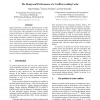Free Online Productivity Tools
i2Speak
i2Symbol
i2OCR
iTex2Img
iWeb2Print
iWeb2Shot
i2Type
iPdf2Split
iPdf2Merge
i2Bopomofo
i2Arabic
i2Style
i2Image
i2PDF
iLatex2Rtf
Sci2ools
MICRO
1997
IEEE
1997
IEEE
The Design and Performance of a Conflict-Avoiding Cache
High performance architectures depend heavily on efficient multi-level memory hierarchies to minimize the cost of accessing data. This dependence will increase with the expected increases in relative distance to main memory. There have been a number of published proposals for cache conflict-avoidance schemes. In this paper we investigate the design and performance of conflict-avoiding cache architectures based on polynomial modulus functions, which earlier research has shown to be highly effective at reducing conflict miss ratios. We examine a number of practical implementation issues and present experimental evidence to support the claim that pseudo-randomly indexed caches are both effective in performance terms and practical from an implementation viewpoint.
Cache Conflict-avoidance Schemes | Conflict-avoiding Cache Architectures | Hardware | MICRO 1997 | Multi-level Memory Hierarchies |
Related Content
| Added | 06 Aug 2010 |
| Updated | 06 Aug 2010 |
| Type | Conference |
| Year | 1997 |
| Where | MICRO |
| Authors | Nigel P. Topham, Antonio González, José González |
Comments (0)

